GROW BIGGER EARS #4: The "Audio Autopsy" Ocular Power Pop Playlist-A Sight For Sore Ears
There are so many...this is just the tip of the eyes-berg: Nazz, The Who, The Searchers, The Records, and Jackson Browne.
Duck responsibilities, and take a gander at these swan-derful tunes! Bugs already has his favorites (he tells me it was a toss-up between two…one rose to the top, winning by a hare)!
And now, the aural five all about the ocular orbs (approx. 18 min.):
1. Nazz “Open My Eyes,” 1968, SGC (Screen Gems-Columbia) Records, an Atco affiliate distributed by Atlantic
A fascinating rock footnote reveals that, in 1968, there were, indeed, exactly two Nazz-es. One was in Phoenix, and soon moved to L.A., where one Vince Furnier and his happy little band of longhairs met Frank Zappa and his Straight/Bizarre Records, and managed to land on “Alice Cooper” as their nom-de-band.
None of which affected Todd Rundgren and his Nazz (bassist Carson Van Osten, drummer Thom Mooney, and keyboardist Stewkey), clear across the country, in Philadelphia. The first single from their debut, self-titled album, “Open My Eyes,” written by Todd, failed to chart.
The album (except two songs) was produced by the band, Michael Friedman, and Bill Traut, whose name is curiously missing as a credit from the single’s label. We may know why:
Rundgren was dissatisfied with Traut's final mix of the album, so the Nazz went to a studio in New York to do overdubs and remixing for two tracks, “Open My Eyes” and its flip, “Hello It's Me” (dirge-like on the album and B-side, it was recorded faster and more successfully by a solo Todd in 1972 on his Something/Anything album, on this writer’s List of Top Ten Albums of All Time).
This entertaining 1968 promo video for “Open My Eyes,” when such things were completely unheard of (and because it’s fun to watch a 20-year-old Todd, who, just two years before, had already written his “Hello It’s Me” masterpiece!):
The Nazz wanted a flanging effect (sometimes called “phasing,” and explained in detail here with video) you hear in “Open My Eyes,” but the studio engineers didn’t know how to create it; Rundgren, according to Kieron Tyler’s 2019 Open Our Eyes: The Anthology, discovered how to do it accidentally while playing with a two-track tape machine.
This, essentially, was the beginning of a decades-long producing career for Todd (Hall & Oates, Meatloaf, XTC, countless others), of course, supplementing the performing, songwriting, touring, video production, and other treacherous acts of trend-setting that finally landed him in the Rock’n’Roll Hall of Fame in 2021!
Related: This personal account of my two weekends spent with the New York Dolls in 1973, and asking one of their guitarists what they thought of Todd’s production on their debut, PLUS, meeting with Todd 5 years later over drinks! Do I tell him?
It’s behind an inexpensive paywall because you’re getting TWO personal star meetings in one (not to mention exclusive content available nowhere else)!:
Into The Doll House With Todd Rundgren
👉This article was originally published on Substack on August 5, 2021. It was the debut…the actual launching-off point for FRONT ROW & BACKSTAGE! Now, after 730 days and 312 articles, I thought it was time to dust off this inaugural gem, give it a proper face-lift, up-date it with music, and maybe add a few more photos!
2. The Who, “Behind Blue Eyes,” 1971, Decca (MCA) Records (US)
A logical segue from Todd and his Who-inspired Nazz, comes this FM radio staple, and a cornerstone of the London bashers (and 1990 Rock HOF inductees) in their live act.
Their second single from Who’s Next, it was written by guitarist, Pete Townshend, and was initially intended for (and ultimately abandoned, deciding on a more traditional album) the band’s Tommy follow-up, a sci-fi rock opera called Lifehouse.
Curiously, “Behind Blue Eyes” was initially considered for UK single release, but Townshend claimed that the song was “too much out of character” for the British singles market, according to Steve Grantley and Alan Parker in their The Who by Numbers: The Story of the Who Through Their Music.
However, the song did eventually see a single release in France, Belgium, and the Netherlands. The song reached #34 on the Billboard Hot 100 and #24 in Cashbox.
From the “Nobody Asked Me, But…Department”: Cashbox called it “another Townshend masterpiece in traditional Who fashion,” which makes me wonder what kept the band’s UK label, Track—founded in 1966 by The Who’s two managers—from releasing it in their home country, despite Townshend’s initial misgivings about it being “too much out of character”?
Looking at you, Kit Lambert and Chris Stamp! Turns out Townshend was actually running the label?😱
3. The Searchers, “Hearts in Her Eyes,” 1979, Sire Records
In a repeat engagement, and held over from GROW BIGGER EARS #2, where they contributed a song from 1964: The Searchers, 15 years later! It’s hard to understate just how respected these original, hitmaking Merseybeat monsters were by the time they signed with Seymour Stein’s Sire Records in the late ‘70s, in what many called “a comeback”!
By 1979, when their self-titled album, The Searchers, was released (from whence “Hearts in Her Eyes” emanates), punk and new wave had crested. In something of a natural progression, skinny-tied power-poppers followed, and filled Hollywood clubs with A&R guys right behind them, pen in hand.
Mike Pender, John McNally, Frank Allen, and Billy Adamson were 40-year-olds not at all dismissed by the young whippersnappers, but enthusiastically and reverently embraced. The Searchers succeeded in bringing all the ringing guitars, layered harmonies, la-la’s and hand-claps the kids could handle.
Putting their unique spin on songs by Tom Petty (“Lost in Your Eyes,” which almost made this Playlist!) and Bob Dylan (“Coming From the Heart”) for the album, they were actually given “Hearts in Her Eyes” by obvious fans, John Wicks and Will Birch of leading British power poppers themselves, The Records.
Sure enough, in The Records’ own 1980 cover of the song they gifted The Searchers, they all but duplicate the elders’ arrangement to within a couple seconds of play time!
4. John Wicks and The Records, “Starry Eyes” (live in L.A. 2013 version), original recording (which is not on Spotify) was released on Virgin Records, the 1978 audio of which can be heard here, produced by Birch and Dennis Weinreich:
As if on cue, Wicks, Birch, and the original Records, Phil Brown and Huw Gower (who replaced Brian Alterman, in a brief stint as original guitarist), follow the song they bestowed upon The Searchers with their “Starry Eyes,” which AllMusic has called, “a near-perfect song that defined British power pop in the '70s.”
Peaking at #56 on the US charts in October 1979, it was a far bigger hit in the states than in the UK likely due, in part, to its clear influence by American power pop. The song and band kindly returned the favor for many years by strongly influencing others who followed in their jangly, melodic wake.

“Sometimes things just come together,” Wicks revealed to the Washington Times in 2017. “I was listening to the radio and heard, ‘Do Anything You Wanna Do,’ by Eddie and the Hot Rods. I said to Will Birch, who wrote the lyrics, ‘We’ve got to write a song like this!’ It was really cool. I did the music.”

“At the time that song was written, we had this whole thing with our manager: He was a nice guy, [but] he would always put things off. We felt like if we don’t move on faster, things would fall apart. It was my instigation to look for somebody else, which we did.
“Will wrote this song and put it in front of me in this rehearsal room. It didn’t have a title; it just had a place where ‘starry eyes’ went. Because the then-ex-manager’s name was Frank Silver, I called it ‘Silver Song.’ I just used the same kind of jangly chords I’d used as a kid, and five minutes later it was done. I said to Will, ‘This is a classic! This is gonna be big!’”
5. Jackson Browne, “Doctor My Eyes,” 1972, Asylum Records
Browne had found minor success as a songwriter already to this point, according to Allmusic, but had not yet signed his own record deal. After he sent a demo of “Jamaica Say You Will” (the lead track on Browne’s self-titled debut album) to David Geffen in early 1970, Geffen, as a favor, began looking for a record deal for Browne.
In fact, in his search for takers for Browne’s recording services, Geffen and artist-management partner Elliot Roberts approached Atlantic Records president Ahmet Ertegun, to whom Geffen said, “You'll make a lot of money [with Browne].”
Ertegun replied, “You know what, David? I have a lot of money. Why don’t you start a record company and then you'll have a lot of money!”
A deal was then struck in which Ertegun would put up the initial funds, Atlantic Records would distribute Asylum Records, and the profits would be split 50/50.
Jackson Browne’s recording career began, then, as a cornerstone of an eventual growing media conglomerate, first with his label merging with Elektra as Elektra/Asylum Records, then as Warner/Elektra/Atlantic (WEA).
Front Row & Backstage’s key contributor, singer/songwriter/guitarist, Stephen Michael Schwartz (pictured above, mid-’70s), shares his first-hand account, as a 19-year-old, of his experience with Jackson and his “Doctor My Eyes”:
“It was in March of 1972 when I first heard ‘Doctor My Eyes’ on the radio by a new artist named Jackson Browne. Ironically, I had just written a ‘Doctor’ song as well, called ‘Doctor’s Daughter.’”
“After Browne’s show [in a small Hollywood club], I lingered and weaved my way around a side hallway until I came to Jackson’s dressing room. There in a pale light, I saw Jackson sitting with his head in his hands, dejected and complaining about his performance.
“To his left, kneeling next to him, doing her best to comfort her friend, was Joni Mitchell. ‘No, no, you were wonderful!’, Joni insisted. And then, they turned to see this wiry little intruder, guitar in hand. ‘Hi, my name is Stephen Michael Schwartz! I’m a singer-songwriter, and I have a Doctor song too. Can I play it for you?’”
Discover if Joni and Jackson were willing audience members for Stephen’s new song (did they invite him into a new trio they were considering?), or if they had him ushered out of the venue, here:

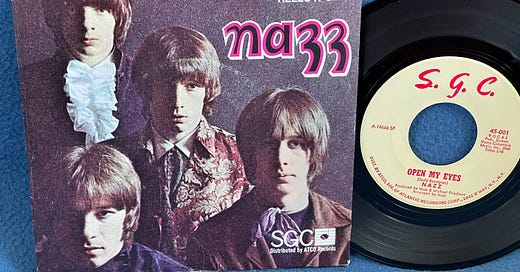




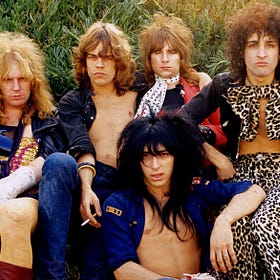

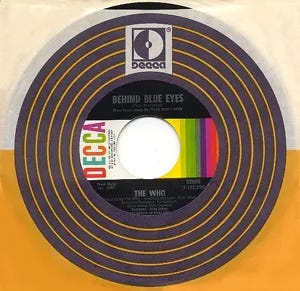

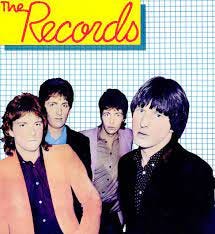


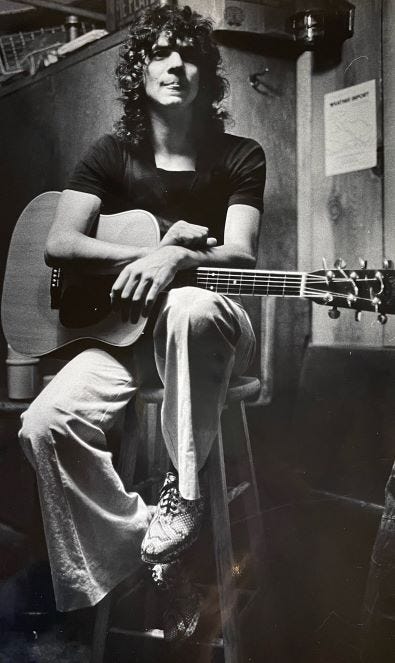



Nice! I had stop and marvel at the plethora of puns in the first paragraph (and title) alone as there clearly exudes a authorial sense of pride in such an ear-ie display of wordplay!
Another great batch of intriguing backstories and cool music, Brad!!